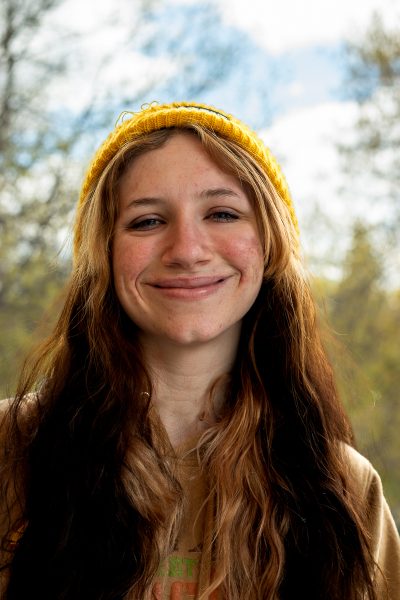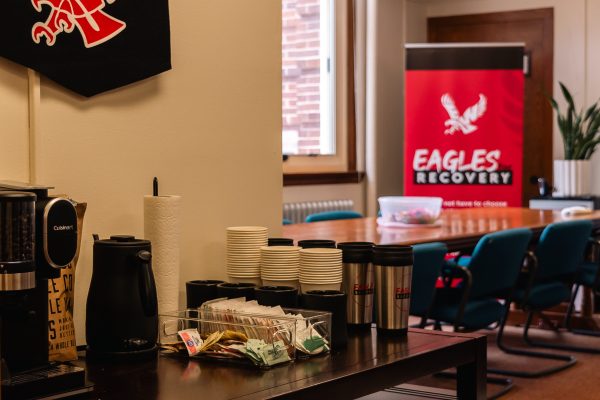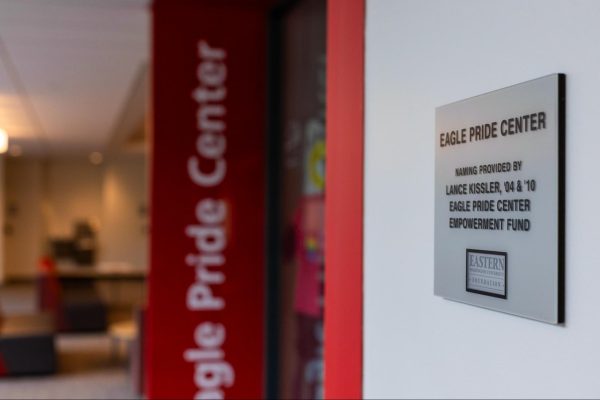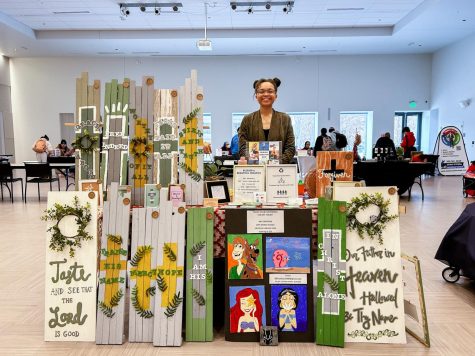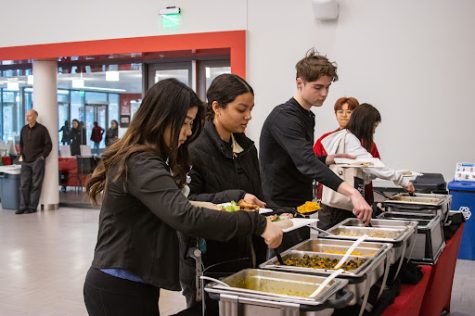Active Minds exposes mental health stigmas

January 22, 2014
Over 3,100 students on campus are currently dealing with or have been diagnosed with a mental illness, based off of enrollment numbers and mental health findings.
According to Eastern’s website, record enrollment shows that 12,791 students are attending the university this quarter alone. With 1 in 4 adults having a mental illness, according to the National Institute of Mental Health, that proves that many students on campus are dealing with a mental illness of some sort.
Active Minds is a national nonprofit organization that seeks to get rid of the stigma surrounding mental illness on college campuses, as said by Nicole Stearman, creator and president of EWU Active Minds, a club on campus that aspires to raise awareness on mental health.
Stearman, along with members of the club, pass out pins that say “1 in 4” on them for that very reason: people are affected by mental illness, one way or another.
“It‟s more than anyone could have possibly guessed. I think just that statistic alone is very powerful in at least starting the conversation on mental health,” said Stearman.
Stearman was inspired to create the club after reading an Easterner article on mental health that mentioned Active Minds. At the same time, her sister was diagnosed with schizoaffective disorder.
“My sister, who is very, very close to me, … was diagnosed with schizoaffective disorder at 15, so I’ve been living with her and growing up in that setting of absolutely support and everything you could ask for in a caring family. … She wasn’t doing very well and would talk to me because we’re really close and she would talk to me about it,” said Stearman.
According to the National Alliance on Mental Illness, schizoaffective disorder is a mental illness that resembles both schizophrenia and mood symptoms similar to bipolar disorder.
Stearman was involved in Eagle Pride and attended the Pride Center often. While talking to her sister, Stearman recalls her making a comment about her support system at Pride.
“She said that I was lucky to have somewhere to go, like a community of people to go to because she felt like she didn’t have that. It felt like she would just go out for psychiatry, counseling appointments with her doctors. But it‟s a lot better now. It‟s not the case anymore, but at that time, it was pretty rough,” said Stearman.
Stearman knew she needed to create a sense of community for those just like her sister.
“I knew that I needed to do something about it. I was thinking about starting a club based around mental health and this de-stigmatization of that and then I read that article, and it all just set perfectly into place. I immediately got to work,” said Stearman.
Active Minds, Inc. is a non-profit organization that is dedicated to raising awareness surrounding mental health on college campuses, as stated on their website.
Active Minds, Inc. was founded in 2003 by Alison Malmon. She attended the University of Pennsylvania alongside her brother, Brian Malmon. He had been experiencing depression and psychosis for many years, yet concealed his symptoms from everyone around him, as said on the organization’s website.
According to the Active Minds website, he had been diagnosed with schizoaffective disorder and started receiving treatment, yet shortly ended his own life on March 24, 2000.
After her brother’s death and hearing her friends talk about mental health issues on campus, Alison Malmon wanted to combat the stigmas surrounding mental illness and created Open Minds, the first chapter, which then turned into Active Minds.
There are now over 400 chapters on college campuses all over the country, according to their website.
According to Nicole Stearman, her main goal with EWU Active Minds is to make connections with students so they feel comfortable in the club setting and are able to courageously make the leap to be comfortable within the school as well, not just within the Active Minds group.
“We have to tackle the problem of the stigma surrounding mental illness. In order to have all students feeling comfortable and safe on campus, we have to educate all the students about mental health and mental illness,” said Stearman.
According to Stearman, some of the activities that the club does is create chalk drawings and write chalk messages all over the grounds of Eastern to bring awareness to mental health, as well as promote Active Minds. The club organizes open forums for students to come and ask questions to other students who are in recovery from a mental illness. Group members also hold meetings on news topics they hear about regarding mental health and stigmas, as well as suicide prevention.
Dr. Russell Kolts, professor of psychology at Eastern, was approached by Nicole Stearman in 2012 to be the advisor for Active Minds because of his expertise in compassion-focused therapy.
According to Kolts, the main focus of this form of therapy is helping people work with difficult emotions and those who tend to self-criticize. Many people who experience depression and anxiety self-attack in response to these difficult feelings. “One of the things that we need to do if we are helping folks like that is to help them learn different ways of dealing with these emotions so they‟re not doing as much self-attacking, which I felt fit really nicely with Active Minds emphasis on reducing shame and stigma around mental illness on campus. It seemed like a real good fit,” said Kolts.
According to Stearman, she is constantly asked if Active Minds is like a support group for students dealing with mental health issues.
“This is a place where we talk about mental health in the community and how we can get it more out there and prevalent and talking about it,” said Stearman. “It‟s not a support group, but that does not mean we are not a supportive group of people. Being a support group isn‟t what we do, but … you can potentially make friends in the group and start your own support group.”
Mia Fonseca, vice president of Active Minds at Eastern, was inspired by her childhood friend, Nicole Stearman, to be a part of the club. She remembers moments while attending Olympic College in Bremerton, Wash., where most of her friends were away and there were not a lot of activities going on.
“Most of the time, I was in my room by myself. I lived with just my Dad; my parents are divorced. I really wanted to spend my day doing something productive and being active and not just be in my room doing absolutely nothing,” said Fonseca. “[Olympic College] really didn’t have any clubs or activities like this, so like when I got here, I was excited to because there are so many things I could do and I really wanted to do this because of Nicole [Stearman]. It’s not just for Nicole [Stearman], it‟s for everyone,” Fonseca said alongside Stearman, laughing together.
Stearman and Kolts both encourage students to visit CAPS in Martin Hall for professional help if they feel themselves or someone they know might be suffering with a mental illness.
“Seek help because it is there. You might not know about it and that’s where we step in to tell you about it and to make sure that you know about it, where it is, what the features are, what exactly are the services you can use and benefit from. Seek help and don‟t keep it to yourself. That will make things worse,” said Stearman.
Kolts made a point that CAPS is paid by students through their student activities fees, meaning they do not have to pay anything out of pocket to talk one-on-one with a therapist or attend a group counseling session.
“If you want to see me for therapy out in private practice, it’s $150 an hour. That‟s cheap. I’m not terribly expensive as doctoral level private practitioners go,” said Kolts. “If you want to see me at CAPS and I‟ve got an opening, it’s free. It doesn‟t cost you a dime; you pay for it through your student‟s activities fee.”
According to Kolts, he understands that being in college is an important time in students’ lives when it comes to defining themselves. From choosing majors and deciding what their career is going to be, it can be a very vulnerable time for students on campus.
“It can feel really vulnerable to feel like you’re struggling in some way or another. I think people … will maybe strive to hide or to minimize the things that they think aren’t so flattering about themselves. In the form of emotional difficulties, that can take the form of stigma,” said Kolts. “Somehow, it‟s perceived as different from if you have a physical ailment or if you’re struggling in some other way that struggling with emotions. I think the public perception that if you‟re struggling with your emotions, there’s something wrong with you or there’s something weak about you.”
When asked about the 1 in 4 statistic and what he, personally, would say to students on campus who are struggling with mental illness, Kolts looked down in empathy in an attempt to hold back tears. “It’s not your fault,” Kolts said as he looked up. “It’s not your fault that you’re struggling with this. There’s nothing wrong with you … That‟s what I’d say. I’d remind them that there are many, many people in this world that care about what they’re doing and they believe in them and want to help them feel better. That‟s what I’d say.”
Stearman recites a quote by creator Alison Malmon of Active Minds, Inc.
“She said “Not everyone has mental illness, but everyone has mental health.‟ It’s really important to not ignore that and students need to know about it for themselves and also to support others because it’s more common than people might think,” said Stearman.
For more information on Active Minds at EWU, visit their Twitter page



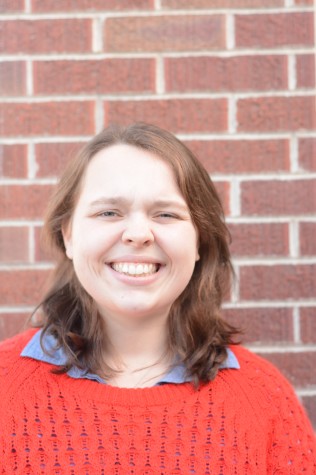


![Simmons said the biggest reasons for her success this year were “God, hard work, and trusting [her] coach and what she has planned.”](https://theeasterner.org/wp-content/uploads/2024/05/image1-1-1200x800.jpg)


